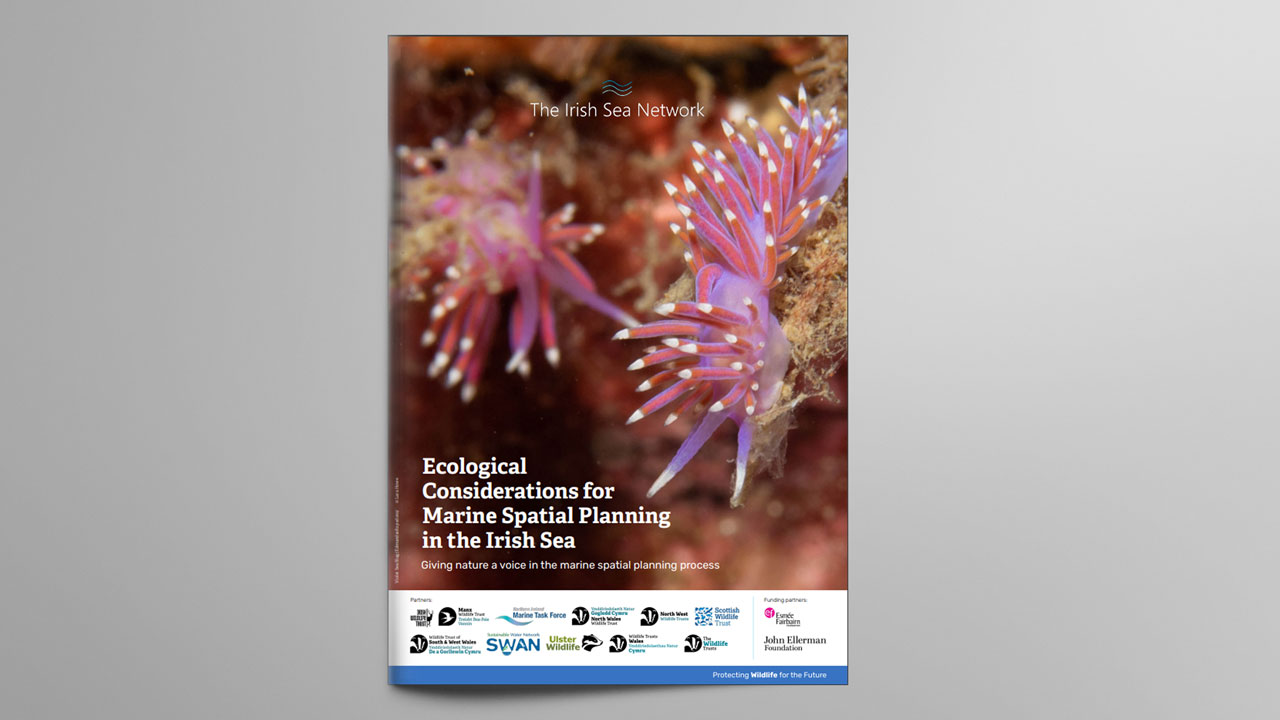A group of 13 conservation bodies across all the Irish Sea nations, known collectively as the Irish Sea Network [1] , is urging planners in all six nations bordering the Irish Sea to collaborate and cooperate for the sake of nature. In a report out today [2], the Network calls for planners to work together strategically and ensure that wildlife is protected, as they review how the Irish Sea is used.
The Irish Sea, which is bordered by England, Wales, Scotland, Ireland, Northern Ireland and the Isle of Man, is coming under significant and increasing pressure from activities such as industrial fishing, aquaculture, offshore renewable energy development, shipping, military activity, recreational activity, and pollution. All of these activities take their toll on marine species that are already endangered by the impacts of climate change.
The Irish Sea Network reports that while over a third of the Irish Sea has been designated as Marine Protected Areas (MPAs), as little as five per cent is actually managed for nature, and less than 0.01 per cent is fully protected from damaging activities. Ireland contributes only a tiny part of the designation, as its Marine Protected Areas Bill, which would provide for MPA designation and management, is still to be published.
This leaves the Irish Sea’s wildlife and the habitats on which they depend at serious risk, with little chance for nature to recover. As well as its intrinsic value, people depend on healthy seas because they produce oxygen, sequester carbon on the seabed, provide food security, livelihoods for local fishing and coastal communities, enable low-impact eco-tourism opportunities, and contribute to our wellbeing and culture.
Marine wildlife doesn’t respect borders – yet each Irish Sea nation produces separate marine planning documents. Each plan will cover a huge range of uses of the Irish Sea, from rules about fishing and renewable energy to shipping and tourism. The Irish Sea Network says all planners and decision-makers must collaborate and cooperate better and with urgency, to consider the Irish Sea as a whole, and ensure that the biodiversity and climate crises are at the forefront during this process.
Grace Carr, Irish Wildlife Trust Marine Advocacy Officer said “As we all know, nature does not recognise borders and so it’s imperative we take a cross-border approach when designating areas for protection, fishing and industry in this biodiverse area. With the new Irish MPA bill due to be released early this year, the knowledge sharing and collaboration within this report will make it an important tool when advocating for nature and ecosystem-focused Marine Spatial Planning in the Irish Sea.”
Sinéad O’ Brien, Sustainable Water Network (SWAN) Co-ordinator said, “This Irish Sea Network report has highlighted how the Irish Sea is getting much busier and, as a result, there is an urgent need for effective planning to safeguard its precious marine wildlife and habitats. A collaborative ecosystem-based approach, that has regard for the environmental sensitivities of what can go where and when, is needed in order to protect and restore the health of the Irish Sea for all.
However, SWAN commissioned research, found Ireland’s first spatial plan from 2021, the National Marine Planning Framework, did not meet these criteria. It was created without a coherent network of Marine Protected Areas (MPAs) or maps of vulnerable ecosystems and, as a result, the plan needs to be fully revised. The key recommendations for marine spatial planning for the Irish Sea in this report must be applied.“
Emma Armshaw, Marine and Coastal Policy Officer (SWAN) said, “Legislation for Irish Marine Protected Areas is fundamental for marine spatial planning for the Irish Sea. However, three years after the National Marine Planning Framework, we still don’t have this, with continual delays preventing the bill from being published. What has been drafted so far lacks many of the key criteria highlighted in this report: strength and ambition with adequate strict protection, a robust management framework, and a commitment to principled stake holder engagement. With a strong MPA bill, Ireland can best meet its responsibility of ensuring the Irish Sea, and all of Ireland’s marine area, is in good health for all who benefit from it. This will furthermore allow the biodiversity and climate crises to be tackled effectively together. It needs to be a top priority for this Government.“
Notes:
[1] The Irish Sea Network is a partnership of organisations from around the Irish Sea: Irish Wildlife Trust, the Sustainable Water Network (SWAN), the Northern Ireland Marine Task Force, Manx Wildlife Trust, North Wales Wildlife Trust, North West Wildlife Trusts – Cumbria, Lancashire and Cheshire, The Wildlife Trusts, Scottish Wildlife Trust, Ulster Wildlife, Wildlife Trust of South and West Wales, and Wildlife Trusts Wales.
[2] The Irish Sea Network’s report ‘Ecological Considerations for Marine Spatial Planning in the Irish Sea’ is published on 8 February 2024 and can be read online here.

